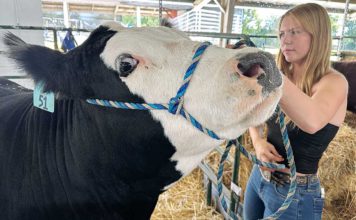It’s a story too seldom told, the story of a life well-lived,
the story of a Gilroy legacy that can never be fully measured. It
comes in the form of a diminutive woman with a big heart.
It’s a story too seldom told, the story of a life well-lived, the story of a Gilroy legacy that can never be fully measured. It comes in the form of a diminutive woman with a big heart.
Many Gilroy residents are preparing to celebrate the life of LaRhee Nichols, who passed away on Aug. 18 at the age of 103.
LaRhee was born April 11, 1902, in Arizona, back when it was still Indian Territory.
She and her husband Elton were married for more than 75 years and raised five children: Doris, Amy, Paul, Elton Jr., and LaRhee. LaRhee’s legacy lives on in more than just her own biological offspring.
After moving to California in 1926, LaRhee and her husband worked as youth leaders, mentoring hundreds of young people over the years.
In the 1940s, LaRhee and her husband were the first people in Santa Clara County to openly accept Japanese families as they returned home after being held in internment camps during WWII.
While others shunned the returning Japanese Americans, LaRhee and her husband met them at their trains, located housing for them, arranged health care, tried to find them jobs, and worked to secure the return of their property.
“We battled,” LaRhee said, “We tried to locate their old homes, but many times they had been ransacked and vandalized while standing empty. Many of them were burned to the ground while the family was interned.” Many had lost everything. LaRhee immediately invited these Japanese Americans to her church where they were warmly welcomed into the activities there.
Maybe it was the childhood memories she had of starving Indians who came to the back door to beg for food that first filled her with empathy for those experiencing hard times. She said, “My mother never sent them away empty-handed.”
LaRhee was a great supporter of St. Joseph’s Family Center, and it was she who encouraged many Gilroyans to become more involved in helping the low income and homeless of our community.
She was a pioneer in working with migrant farm workers, going to visit the work camps, and helping set up a mobile thrift shop.
“I’m just starting to feel my age,” LaRhee told me at age 100. At her 100th birthday party, LaRhee entertained company from Oregon, Texas, New Mexico, and even from as far away as the Netherlands – 100 visitors signed the guest book.
LaRhee was a great friend to Eunice Coates, a teacher at Glen View and Brownell schools. “The Nichols took care of me when I was sick,” she says. “They were like second parents to me.” Their friendship continued for 46 years, and Eunice visited LaRhee every Sunday until the week she died.
The Japanese Americans she had helped came to visit her years later and spoke movingly of what LaRhee had meant to them and how she had helped them start their lives over again. She received Christmas cards from some of these grateful Americans for more than 55 years.
The help she gave inspired others after her to help those they came into contact with, and they in turn helped others.
This living chain continues on into the future, and generations of people will live better lives because of it.
This is the legacy of a Gilroy woman who is treasured in the hearts of many, a woman who had the courage to live a life of extraordinary generosity, love and compassion.
Kat Teraji’s column appears every Thursday in the
Take 2 section of the Dispatch. You can contact her at
ka****@*****on.net.













